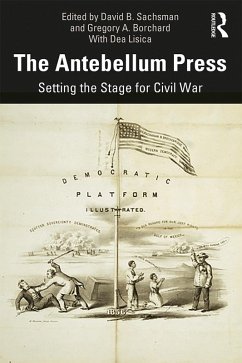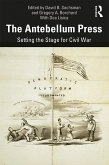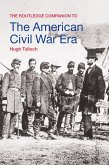The Antebellum Press (eBook, PDF)
Setting the Stage for Civil War
Redaktion: Sachsman, David B.; Borchard, Gregory A.
41,95 €
41,95 €
inkl. MwSt.
Sofort per Download lieferbar

21 °P sammeln
41,95 €
Als Download kaufen

41,95 €
inkl. MwSt.
Sofort per Download lieferbar

21 °P sammeln
Jetzt verschenken
Alle Infos zum eBook verschenken
41,95 €
inkl. MwSt.
Sofort per Download lieferbar
Alle Infos zum eBook verschenken

21 °P sammeln
The Antebellum Press (eBook, PDF)
Setting the Stage for Civil War
Redaktion: Sachsman, David B.; Borchard, Gregory A.
- Format: PDF
- Merkliste
- Auf die Merkliste
- Bewerten Bewerten
- Teilen
- Produkt teilen
- Produkterinnerung
- Produkterinnerung

Bitte loggen Sie sich zunächst in Ihr Kundenkonto ein oder registrieren Sie sich bei
bücher.de, um das eBook-Abo tolino select nutzen zu können.
Hier können Sie sich einloggen
Hier können Sie sich einloggen
Sie sind bereits eingeloggt. Klicken Sie auf 2. tolino select Abo, um fortzufahren.

Bitte loggen Sie sich zunächst in Ihr Kundenkonto ein oder registrieren Sie sich bei bücher.de, um das eBook-Abo tolino select nutzen zu können.
The Antebellum Press: Setting the Stage for Civil War reveals the critical role of journalism in the years leading up to America's deadliest conflict by exploring the events that foreshadowed and, in some ways, contributed directly to the outbreak of war.
- Geräte: PC
- mit Kopierschutz
- eBook Hilfe
Andere Kunden interessierten sich auch für
![The Antebellum Press (eBook, ePUB) The Antebellum Press (eBook, ePUB)]() The Antebellum Press (eBook, ePUB)41,95 €
The Antebellum Press (eBook, ePUB)41,95 €![The Routledge Companion to the American Civil War Era (eBook, PDF) The Routledge Companion to the American Civil War Era (eBook, PDF)]() Hugh TullochThe Routledge Companion to the American Civil War Era (eBook, PDF)33,95 €
Hugh TullochThe Routledge Companion to the American Civil War Era (eBook, PDF)33,95 €![Aspects of American History (eBook, PDF) Aspects of American History (eBook, PDF)]() Simon HendersonAspects of American History (eBook, PDF)40,95 €
Simon HendersonAspects of American History (eBook, PDF)40,95 €![Black Abolitionists in Ireland (eBook, PDF) Black Abolitionists in Ireland (eBook, PDF)]() Christine KinealyBlack Abolitionists in Ireland (eBook, PDF)42,95 €
Christine KinealyBlack Abolitionists in Ireland (eBook, PDF)42,95 €![The Routledge History of U.S. Foreign Relations (eBook, PDF) The Routledge History of U.S. Foreign Relations (eBook, PDF)]() The Routledge History of U.S. Foreign Relations (eBook, PDF)45,95 €
The Routledge History of U.S. Foreign Relations (eBook, PDF)45,95 €![The Origins of the Modern Chinese Press (eBook, PDF) The Origins of the Modern Chinese Press (eBook, PDF)]() Xiantao ZhangThe Origins of the Modern Chinese Press (eBook, PDF)47,95 €
Xiantao ZhangThe Origins of the Modern Chinese Press (eBook, PDF)47,95 €![The Atlantic Connection (eBook, PDF) The Atlantic Connection (eBook, PDF)]() Anna SuranyiThe Atlantic Connection (eBook, PDF)42,95 €
Anna SuranyiThe Atlantic Connection (eBook, PDF)42,95 €-
-
-
The Antebellum Press: Setting the Stage for Civil War reveals the critical role of journalism in the years leading up to America's deadliest conflict by exploring the events that foreshadowed and, in some ways, contributed directly to the outbreak of war.
Dieser Download kann aus rechtlichen Gründen nur mit Rechnungsadresse in A, B, BG, CY, CZ, D, DK, EW, E, FIN, F, GR, HR, H, IRL, I, LT, L, LR, M, NL, PL, P, R, S, SLO, SK ausgeliefert werden.
Produktdetails
- Produktdetails
- Verlag: Taylor & Francis eBooks
- Seitenzahl: 290
- Erscheinungstermin: 10. Juni 2019
- Englisch
- ISBN-13: 9780429512339
- Artikelnr.: 56961939
- Verlag: Taylor & Francis eBooks
- Seitenzahl: 290
- Erscheinungstermin: 10. Juni 2019
- Englisch
- ISBN-13: 9780429512339
- Artikelnr.: 56961939
- Herstellerkennzeichnung Die Herstellerinformationen sind derzeit nicht verfügbar.
David B. Sachsman holds the West Chair of Excellence in Communication and Public Affairs. He came to the University of Tennessee at Chattanooga from California State University, Fullerton, where he served as dean and professor of the School of Communications. Previously, he was chair of the Department of Journalism and Mass Media at Rutgers University. Dr. Sachsman is the director of the annual Symposium on the 19th Century Press, the Civil War, and Free Expression. His previous works include The Civil War and the Press (2000), Sensationalism (2013), A Press Divided (2014), and After the War (Routledge, 2017). Gregory A. Borchard, a professor in the Hank Greenspun School of Journalism and Media Studies at the University of Nevada, Las Vegas, has written numerous works on journalism history, including A Narrative History of the American Press (Routledge, 2019). Together with David W. Bulla, he is the author of Lincoln Mediated (2015), and Journalism in the Civil War Era (2010). He is also the author of Abraham Lincoln and Horace Greeley (2011) and editor of Journalism History, a quarterly journal published by the Association for Education in Journalism and Mass Communication's History Division.
List of Figures; Preface, David B. Sachsman; Contributors; Introduction, Gregory A. Borchard; Chapter1 Newspapers, Agenda Setting, and a Nation Under Stress, Donald L. Shaw and Thomas C. Terry, with Milad Minooie; Chapter 2 The "Irrepressible Conflict" and the Press in the Late Antebellum Period Debra Reddin van Tuyll; Part I: Nullification, Abolition, and Division; Chapter 3 Nat Turner's Revolt Spurs Southern Fears and Sparks Public Debate over Slavery James Scythes; Chapter 4 Disunion or Submission? Southern Editors and the Nullification Crisis, 1830-1833 Erika Pribanic-Smith; Chapter 5 Abolitionist Editors: Pushing the Boundaries of Freedom's Forum David W. Bulla; Chapter 6 When the Pen Gives Way to the Sword: Editorial Violence in the Nineteenth Century Abigail G. Mullen; Chapter 7 An Editorial House Divided: The Texas Press Response to the Compromise of 1850 Mary M. Cronin; Chapter 8 "The Good Old Cause": The Fugitive Slave Law and Revolutionary Rhetoric in The Boston Daily Commonwealth Nicole C. Livengood; Chapter 9 Franklin Pierce and the Failure of Compromise: Newspaper Coverage of the Compromise Candidate, the "Nebraska Act," and the Midterm Elections of 1854 Katrina J. Quinn; Chapter 10 Abolitionism, the Kansas-Nebraska Act, and the End of Compromise Dianne M. Bragg; Chapter 11 "Like so many black skeletons": The Slave Trade through American and British Newspapers, 1808-1865 Thomas C. Terry and Donald L. Shaw; Part II: The Election of 1856, Dred Scott, and the Lincoln-Douglas Debates; Chapter 12 1856: A Year of Volatile Political Reckoning Dianne M. Bragg; Chapter 13 Doughface Democrats, James Buchanan, and Manliness in Northern Print and Political Culture Brie Swenson Arnold; Chapter 14 "Free Men, Free Speech, Free Press, Free Territory, and Frémont" Gregory A. Borchard; Chapter 15 Newspaper Coverage of Dred Scott Inflames a Divided Nation William E. Huntzicker; Chapter 16 "More than a Skirmish": Press Coverage of the Lincoln-Douglas Debates David W. Bulla; Part III: The Election of 1860 and the Crisis of Secession; Chapter 17 The Democrats Divide: Newspaper Coverage of the 1860 Presidential Conventions Brian Gabrial; Chapter 18 Fanning the Flames: Extremist Rhetoric in the Antebellum Press Phillip Lingle; Chapter 19 The Fire-Eating Charleston Mercury: Stoking the Flames of Secession and Civil War Debra Reddin van Tuyll; Chapter 20 "Our all is at stake": The Anti-Secession Newspapers of Mississippi Nancy McKenzie Dupont; Chapter 21 Exchange Articles Carried by the New York Evening Post, December 13-31, 1860 Erika Thrubis; Chapter 22 War of Words: Border State Editorials During the Secession Period Melony Shemberger; Index
List of Figures; Preface, David B. Sachsman; Contributors; Introduction, Gregory A. Borchard; Chapter1 Newspapers, Agenda Setting, and a Nation Under Stress, Donald L. Shaw and Thomas C. Terry, with Milad Minooie; Chapter 2 The "Irrepressible Conflict" and the Press in the Late Antebellum Period Debra Reddin van Tuyll; Part I: Nullification, Abolition, and Division; Chapter 3 Nat Turner's Revolt Spurs Southern Fears and Sparks Public Debate over Slavery James Scythes; Chapter 4 Disunion or Submission? Southern Editors and the Nullification Crisis, 1830-1833 Erika Pribanic-Smith; Chapter 5 Abolitionist Editors: Pushing the Boundaries of Freedom's Forum David W. Bulla; Chapter 6 When the Pen Gives Way to the Sword: Editorial Violence in the Nineteenth Century Abigail G. Mullen; Chapter 7 An Editorial House Divided: The Texas Press Response to the Compromise of 1850 Mary M. Cronin; Chapter 8 "The Good Old Cause": The Fugitive Slave Law and Revolutionary Rhetoric in The Boston Daily Commonwealth Nicole C. Livengood; Chapter 9 Franklin Pierce and the Failure of Compromise: Newspaper Coverage of the Compromise Candidate, the "Nebraska Act," and the Midterm Elections of 1854 Katrina J. Quinn; Chapter 10 Abolitionism, the Kansas-Nebraska Act, and the End of Compromise Dianne M. Bragg; Chapter 11 "Like so many black skeletons": The Slave Trade through American and British Newspapers, 1808-1865 Thomas C. Terry and Donald L. Shaw; Part II: The Election of 1856, Dred Scott, and the Lincoln-Douglas Debates; Chapter 12 1856: A Year of Volatile Political Reckoning Dianne M. Bragg; Chapter 13 Doughface Democrats, James Buchanan, and Manliness in Northern Print and Political Culture Brie Swenson Arnold; Chapter 14 "Free Men, Free Speech, Free Press, Free Territory, and Frémont" Gregory A. Borchard; Chapter 15 Newspaper Coverage of Dred Scott Inflames a Divided Nation William E. Huntzicker; Chapter 16 "More than a Skirmish": Press Coverage of the Lincoln-Douglas Debates David W. Bulla; Part III: The Election of 1860 and the Crisis of Secession; Chapter 17 The Democrats Divide: Newspaper Coverage of the 1860 Presidential Conventions Brian Gabrial; Chapter 18 Fanning the Flames: Extremist Rhetoric in the Antebellum Press Phillip Lingle; Chapter 19 The Fire-Eating Charleston Mercury: Stoking the Flames of Secession and Civil War Debra Reddin van Tuyll; Chapter 20 "Our all is at stake": The Anti-Secession Newspapers of Mississippi Nancy McKenzie Dupont; Chapter 21 Exchange Articles Carried by the New York Evening Post, December 13-31, 1860 Erika Thrubis; Chapter 22 War of Words: Border State Editorials During the Secession Period Melony Shemberger; Index







